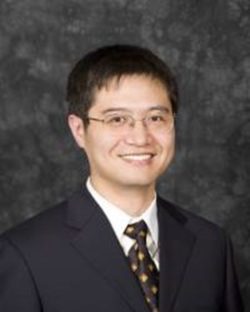
Dr. Lingjia Liu
University of Kansas
Monday, April 3, 2017
11:00AM – HEC 356
Abstract
5G mobile communication has gained lots of interests in recent years as operators across the world try to keep up with the explosive growth in mobile broadband traffic, and to offer innovative new applications and services to continue the momentum of the mobile computing revolution. In 2015, the International Telecommunication Union (ITU) defines the vision and application scenarios of 5G: enhanced mobile broadband services, massive machine type communications, and ultra-reliable and low-latency communications.
In this talk, I will provide a brief overview of my research activities related to enabling technologies for 5G systems including 3D Massive MIMO/FD-MIMO, cooperative/cognitive device-to-device (D2D) communications, sensing-based D2D communications, and coding over finite transport blocks. The focus will be mainly on 3D Massive MIMO/FD-MIMO and cooperative D2D. To be specific, for 3D Massive MIMO/FD-MIMO, I will discuss the channel modeling, direction-of-arrival (DoA) based channel estimation, and capacity analysis. The performance of DoA estimation will be analytically characterized and will be related to the capacity of the underlying 3D Massive MIMO/FD-MIMO system. For cooperative D2D, we will show how rateless coding based cooperative transmission could help underlay D2D to improve the network performance.
Biography
Lingjia Liu received his B.S. degree with highest honor in Electronic Engineering from Shanghai Jiao Tong University, China and Ph.D. degree in Electrical and Computer Engineering from Texas A&M University. Prior to joining the faculty in the EECS Department at the University of Kansas (KU), he spent more than four years at Mitsubishi Electric Research Labs and Samsung Research America (SRA). During his tenure at SRA, he was a technical leader and a leading delegate on downlink MIMO, Coordinated Multipoint (CoMP) transmission/reception, and Heterogeneous Network (HetNet) in 3GPP RAN1 LTE/LTE-Advanced meetings. He received Global Samsung Best Paper Award in 2008 and 2010 respectively. In 2011, he was elected as the New Faces of Engineering 2011 and was recognized during the 2011 National Asian American Engineers of the Year (AAEOY) Awards Ceremony. From 2013 to 2016, Lingjia Liu has been continuously selected as U.S. Air Force Office of Scientific Research (AFOSR) summer faculty fellow. In May 2015, he received the Miller Professional Development Award for Distinguished Research from KU, the only winner selected across all faculty across all engineering departments. In Dec. 2016, he received the IEEE Globecom Best Paper Award.
Lingjia Liu is a senior member of IEEE and is currently serving as Editor of many IEEE and other professional journals. He is co-editor of many special issues and has been serving as the Chair of the Technical Program Committee (TPC) of many international conferences, symposiums, and workshops. For the past 5 consecutive years, he served as the Workshop Chair of IEEE GLOBECOM 5G Workshop and is currently serving on the organizing committee of IEEE WCNC 2017, IEEE DySPAN 2017, IEEE VTC 2017-Fall, IEEE ICC 2018, and IEEE CTW 2018. In March 2017, he was elected as the Vice-Chair, Americas of the IEEE Technical Committee on Green Commun. & Computing (TCGCC).
Lingjia Liu’s general research interests lie in emerging technologies for the next generation wireless networks including delay-sensitive communications, sensing-based D2D, mmW massive MIMO, machine learning for dynamic spectrum access, and energy efficient communication and computing. His research has been funded by the National Science Foundation, Air Force Office of Scientific Research, Air Force Research Laboratory, the State of Kansas, Samsung Research America, InterDigital, FutureWei, and Alion. Due to his contribution in the field, he has been frequently interviewed by IEEE Spectrum on 4G/5G related topics.